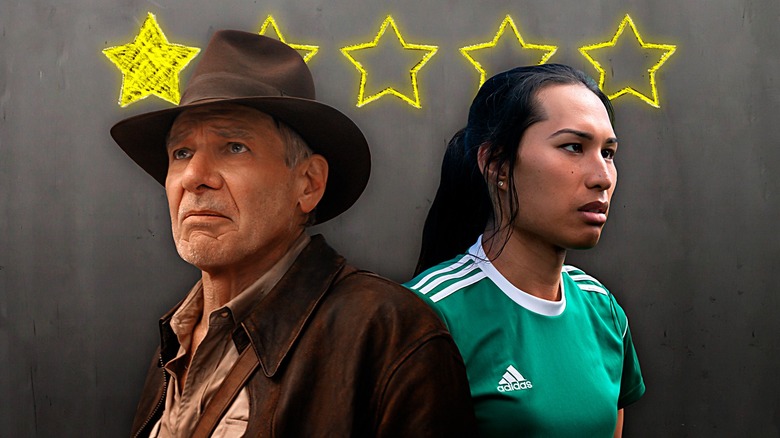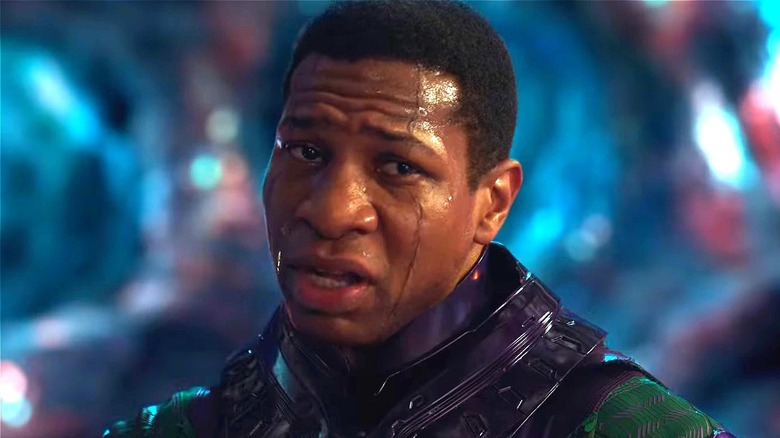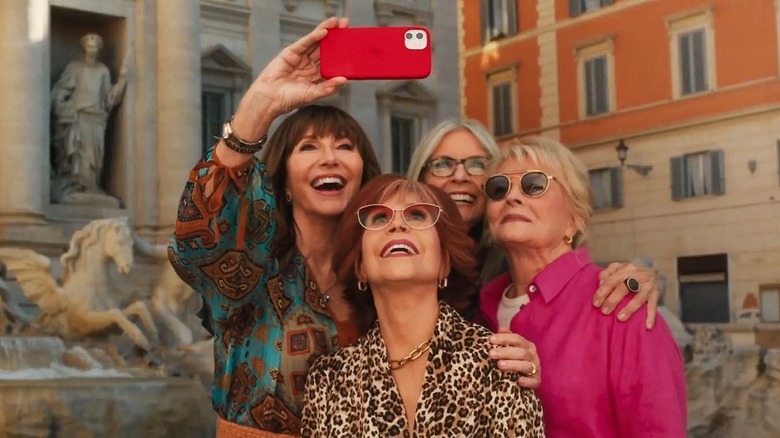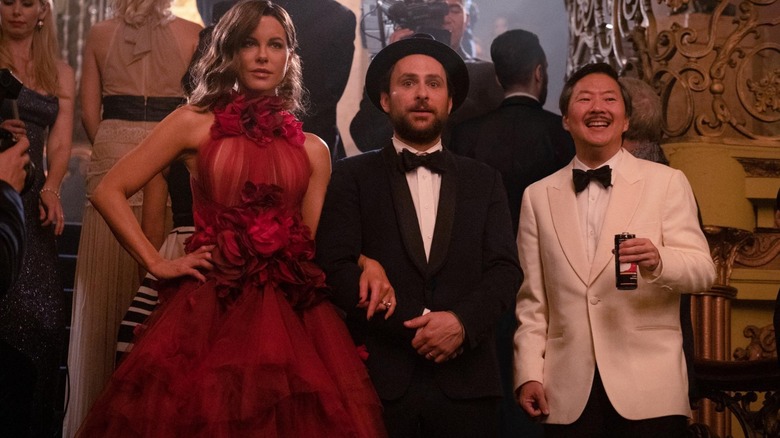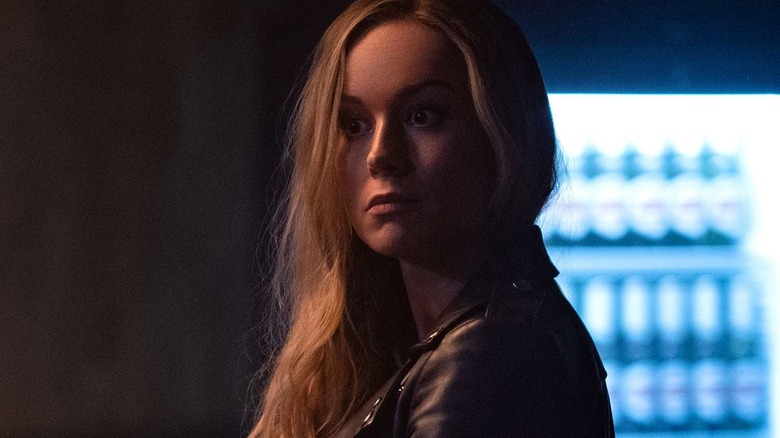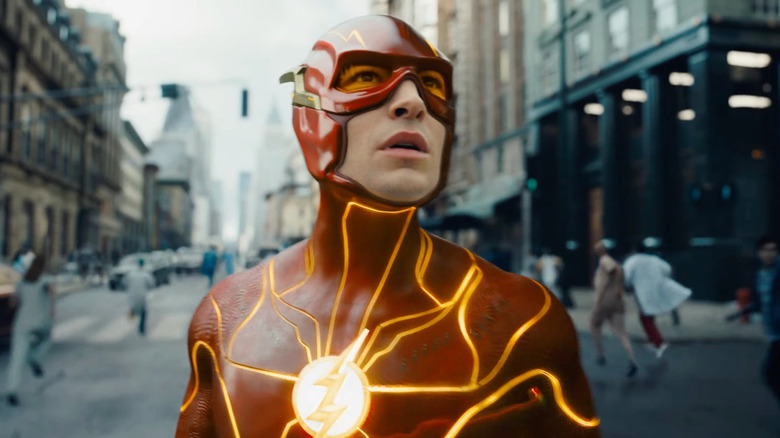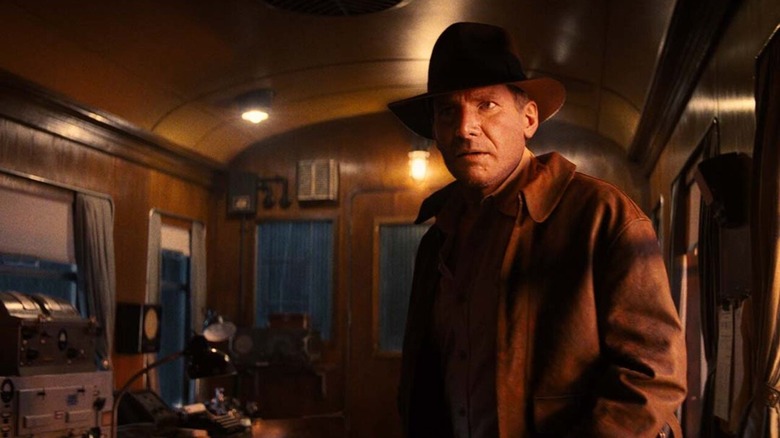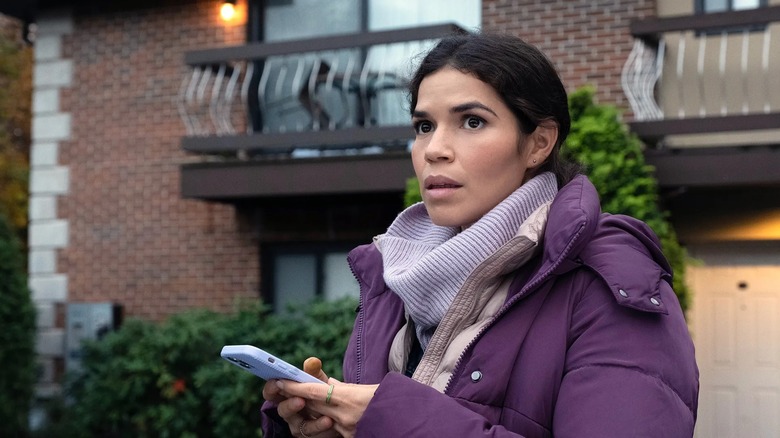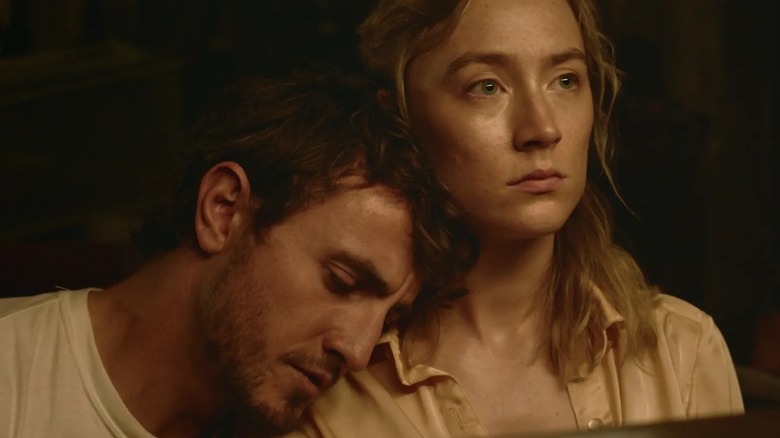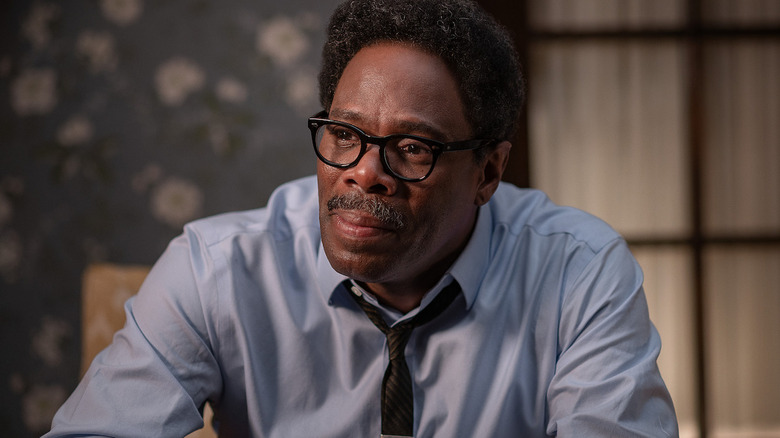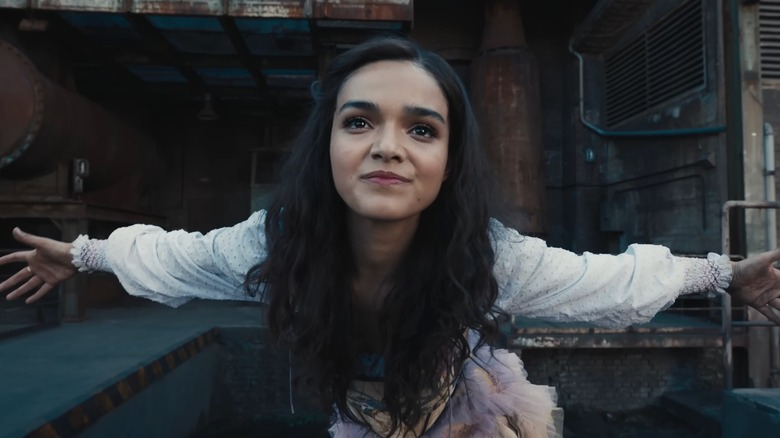The Worst Movie Moments Of 2023
There have been many great movies released in 2023, ranging from arthouse titles like "Past Lives" and "Kokomo City" to mainstream movies like "Barbie" and "Killers of the Flower Moon." But no year is devoid of lackluster films completely, or even decent ones that have inexplicably terrible scenes in them. 2023 cinema was no different, and the year had plenty of sequences that left audiences stupefied, not electrified. These scenes were often emblematic of the larger flaws of the movies that they inhabited, a microcosm of greater artistic shortcomings that can sink an entire motion picture.
The worst movie moments of 2023 ranged wildly in subject matter, length, and other specific details. Some involved confounding moments from superhero movies, failure to land a joke in comedies, and even distractingly subpar moments in otherwise awards-worthy movies. What united all of these moments, though, was a low level of quality that stuck around in people's memories for all the wrong reasons. Join us as we take a look back at some of the worst movie moments of 2023.
The defeat of Kang in Ant-Man and the Wasp: Quantumania
Across the first three phases of Marvel Cinematic Universe (MCU) movies, some of the most memorable moments were ones where the superheroes were recognizably human. The Avengers quietly eating Shawarma after a lengthy battle, or the Guardians of the Galaxy in reflective introspection at Yondu's funeral. In these moments, the movies lived up to the qualities that defined the earliest seminal Marvel Comics: that these superheroes were just like ordinary people. Phase Five of the MCU began with "Ant-Man and the Wasp: Quantumania," a movie so far removed from anything resembling reality that it was an utter slog to get through.
The inexplicable qualities of "Quantumania" were crystallized in the film's ultimate defeat of the main baddie Kang the Conqueror (Jonathan Majors). Already a nebulously defined villain with an overly daunting power set, Kang's unengaging presence comes to a baffling end when he's trapped in a power core thanks to Pym Particles. It's a very abrupt and convoluted wrap-up for the villain, executed with little visual flair. It also undercuts the power of a foe who is supposed to be a formidable force in the MCU going forward — an ironic shortcoming given how much of "Quantumania" is dedicated to setting up future movies. There's no trace of humanity, fun, or tangible emotions in the defeat of Kang — something that is emblematic of the problems plaguing many recent lackluster Marvel projects.
A wedding speech that goes on forever in Book Club: The Next Chapter
Unsurprisingly for a cozy romantic comedy, "Book Club: The Next Chapter" ends with a wedding. This big romantic event is for Vivian (Jane Fonda), the member of the group who was seemingly never ready to settle down. Now, Vivian is preparing to finally tie the knot with Arthur (Don Johnson) with her best pals Diane (Diane Keaton), Sharon (Candice Bergen), and Carol (Mary Steenburgen) in tow. However, at the last minute, Vivian opts to not go through with the wedding, remarking that she loves Arthur but doesn't want to get tied down. In response, Arthur promises to stay with Vivian even without the bond of matrimony uniting them.
On paper, it's not a terrible idea for a climax, but co-writer and director Bill Holderman opts to ratchet up the didactic dialogue that's plagued all of "The Next Chapter" for this big finale sequence. Vivian proceeds to justify her decision in a lengthy wedding speech that seems to waste so much time saying very little. Worst of all, it's a monologue that squanders the immense talents of a legendary performer like Jane Fonda. Surely there was a more entertaining way "The Next Chapter" could've indulged in romantic-comedy climax hallmarks than this.
The visit to a rich mansion in Fool's Paradise
Throughout "Fool's Paradise," Latte Pronto (Charlie Day) bounces around Hollywood and navigates a lot of outsized personalities that represent stereotypical aspects of show business. One of these encounters brings Pronto face to face with the uber-wealthy Lex Tanner (Jason Sudeikis) at this powerful man's mansion. Here, Tanner is depicted as a buffoon while the script by Day (who also directed the movie) also makes time for some jokes at the expense of this man's Latinx housekeeper. This entire sequence, like so many of the ill-advised attempts at comedy in "Fool's Paradise," is utterly torturous to experience.
What makes this scene especially egregious are the jokes about Tanner's housekeeper. Not only are the gags stale, but they also demean one of the rare working-class characters in "Fool's Paradise." This belittling attitude forces audiences to question what even is the point of "Fool's Paradise." Is it trying to speak truth to powerful media institutions or is it just a grab bag of uninspired gags that will knock down ordinary souls if it means getting a laugh? It's a terrible moment that, to add insult to injury, somehow finds zero humor in pairing Sudeikis and Day together. "Fool's Paradise" was a cinematic disaster, but this moment exemplifies its muddled and ill-advised tendencies.
Tess gets caught up on Dominic Toretto in Fast X
Audiences are introduced to the new character Tess (Brie Larson) in "Fast X" in a scene where she walks in on secret agent Aimes (Alan Ritchson) looking at footage of Dominic Toretto and his family shortly after the group was blamed for a terrorist attack in Italy. The flustered Aimes proceeds to get Tess up to speed on the typical actions of these characters — including their fondness for family BBQs — all while the duo are standing in front of a digital backdrop that would've looked unconvincing in a 2012 installment of "Epic Rap Battles of History."
While the "Fast & Furious" movies are famous for their speed and action-heavy spectacle, this exposition-soaked "Fast X" sequence is a limp rag in terms of visuals. Director Louis Letterier shows no imagination or urgency in framing the two characters talking about some of the most wanted fugitives on the planet, and the setting of this sequence is disappointingly routine. Aimes and Tess work for a secret agency, couldn't there be a more outlandish or exciting background to reinforce this? These dismal images are compounded by truly terrible pieces of self-aware dialogue that just regurgitate jokes people made about the "Fast & Furious" movies years ago on Reddit. What a lackluster introduction to Tess and what a crime that an actor as deeply talented as Brie Larson had to handle a scene as bad as this one.
Hello from dead CGI celebrities in The Flash
Nietzsche once said, "If you gaze for long into an abyss, the abyss gazes also into you." Similarly, moviegoers have been gazing into a cinematic landscape so dominated by fan service and nods to classic movies that it was inevitable this landscape would eventually "gaze" back. Who knew such a situation would become so literal, though, with the finale of "The Flash," which sees Barry Allen (Ezra Miller) realizing that his time travel shenanigans are causing ripple effects across multiple dimensions of DC Comics characters. To demonstrate this, the camera floats through multiple realms where CG versions of Nicolas Cage's Superman or Christopher Reeve's Superman exist. These digital versions of real (and, in some cases, deceased) celebrities end up just staring at the audience, doing nothing but hovering around and reminding moviegoers of older movies.
It's an egregious moment on countless levels, including the dismal CG effects work used to realize these characters. There's also no getting around how creepy and exploitative it feels to see a digital version of the late Christopher Reeve flying around on the silver screen. Rather than being an exciting nod to the past, these cameos are just reminders to audiences that corporations in the present can exploit anyone's face for all of time. This hollow attempt to pay homage to DC movies past — some of which never even existed in the case of Cage's Superman — is the disgusting apex of modern media's fixation on fan service above engaging storytelling.
The first reveal of digitally de-aged Indiana Jones and the Dial of Destiny
Past "Indiana Jones" installments began by thrusting audiences into a grand self-contained adventure already in progress ... so why not continue the tradition with "Indiana Jones and the Dial of Destiny." This fifth installment in the "Indiana Jones" saga takes place in the final days of World War II with Indy (Harrison Ford) being kidnapped by Nazis. Initially showing up on-screen with a burlap sack over his head, the baddies eventually pull off the sack to reveal the face of young Indiana Jones brought to life through extensive CGI de-aging. It's supposed to be a gasp-worthy moment that makes audiences think they're watching footage of Harrison Ford from decades earlier. Instead, it falls flat as the fakery doesn't hold up to scrutiny.
Digitally de-aged Indy just doesn't look right, particularly with the hints of rubbery skin or those eyes that just seem slightly off. Worst of all, this isn't the only time a heavy reliance on digital effects sinks "Dial of Destiny." On the contrary, this failed moment is a dark harbinger of what's to come, and the digital effects in the movie frequently prove distracting. Maybe they should've just kept that sack over the head of Dr. Jones.
The weird dismissal of anti-Semitic GameStop stock Reddit posts in Dumb Money
"Dumb Money" hastily tries to dramatize recent real-world events, exploring the phenomenon of online investors getting rich off GameStop stock that occurred at the start of the 2020s. In the process of scrambling to be the first movie about this, it ends up gently stepping over some of the darker and more complicated aspects of this story. This is best exemplified by a scene where dedicated investor Jenny (America Ferrera) is talking to her hospital co-worker Chris (Larry Owens) about the GameStop stock shortly after this whole fiasco has become national news. Chris mentions that he's nervous about the online community that's popped up around this stock and specifically the anti-Semitic rhetoric that's common in the memes shared by GameStop stock devotees.
Jenny quickly remarks that "every group has a few bad apples", and promises that the anti-Semitic folks have been banned, and then she and "Dumb Money" as a movie never grapple with that concept ever again. The memes from the GameStop investors shown throughout "Dumb Money" utilize ableist slurs or misogynistic language, and the anti-Semitic rhetoric found within various factions of this community is incredibly well-known. Rather than grappling with how people who perceive themselves as "the little guy" can also engage in dehumanizing behavior, "Dumb Money" opts for a simplified story that ignores the darker and more challenging aspects.
Junior's monologue about his disgusting co-workers in Foe
One of the greatest tests Junior (Paul Mescal) receives in "Foe" — to determine how he's handling the prospect of getting sent out to live in Earth's orbit — comes towards the end of the film's second act, as evaluator Terrance (Aaron Pierre) takes him into an empty room and asks him some questions. These queries launch Junior into a diatribe against his co-workers at the local chicken plant, with Junior especially registering disgust at the way their teeth or spit sometimes just fall out nonchalantly when they're eating. He's sickened by these people and, perhaps, by the thought of being stuck in the same class as them as well as how the world is sending folks out into the cosmos rather than taking care of clearly sick folks here.
There's lots of subtext going on here, but it's hampered by the insecure filmmaking from director Garth Davis, which ends up smothering Junior's monologue with an intrusive score. Mescal's performance is also misdirected to go way too big too soon. These outsized tendencies don't communicate the idea that Junior is a man who has lived around the unspeakable for eons, but rather the filmmakers behind "Foe" being uncertain audiences would understand this scene is "dramatic" without the score telling them this. It's all too ham-fisted and ends with Junior just punching the walls behind him. The conceptually interesting ideas informing this "Foe" scene get lost in the noise, and that's a real shame.
Bayard Rustin leaves his job in Rustin
A key moment in "Rustin," a biopic about civil rights activist Bayard Rustin (Colman Domingo), comes when the titular lead opts to leave his job and return to the world of activism. As he's leaving, Rustin is stopped by his boss, who tries to persuade him to stay by outlining his entire backstory in an unnecessarily expository manner. This boss is aware that Rustin is "mad at [his] parents" and has personal identity issues, but if he quits this job now, "I can't protect you". Rather than showing audiences the formative events that made Rustin who he is, the movie opts to just have this throwaway supporting character practically look at the audience and explain this historical figure's psychology.
It's a horrific piece of writing that immediately takes you out of the scene and sees writers Julian Breece and Dustin Lance Black refusing to let audiences get closer to a man as fascinating as Bayard Rustin. This trailblazer deserves to have his story told in methods as compelling as himself, not have key parts of his story unfurled in clumsy expository dialogue. There are all kinds of poorly-written sequences scattered throughout the disappointing "Rustin," but this particularly dismal dialogue is especially sloppy and ham-fisted.
Jaiyah's apology to her coach in Next Goal Wins
Jaiyah Saelua (Kaimana) is the fa'afafine player (fa'afafine being a Samoan term for someone existing outside the gender binary) at the center of so many uncomfortable scenes in "Next Goal Wins." This includes a sequence where newly hired Coach Thomas Rongen (Michael Fassbender), fed up with his players, berates Jaiyah by referring to her by her dead name. After repeatedly deadnaming her, Jaiyah proceeds to push Rongen to the ground. That's not the end of this interaction, though. The worst scene of "Next Goal Wins" (and possibly all of 2023 cinema) comes right after, as Jaiyah shows up at Rongen's door to apologize for her behavior.
It's a stunningly ill-conceived moment that puts all the effort on Jaiyah to make things right with a transphobe, while nothing in writer-director Taika Waititi's screenplay has gotten audiences even remotely invested enough in Rongen as a character to want to see him forgiven. He comes off like an abusive jerk, who isn't deserving of this heartfelt apology. Jaiyah is constantly undercut and treated as less human throughout all of "Next Goal Wins" but this baffling apology sequence is an especially egregious creation.
That Katniss namedrop in The Hunger Games: The Ballad of Songbirds & Snakes
The best moments of "The Hunger Games: The Ballad of Songbirds and Snakes" come from the performance of Rachel Zegler as Lucy Gray Baird. She's so full of life and energy in her turn as this rebellious character, not to mention that Zegler's legendary vocal chops are spectacularly utilized. Tragically, this extremely talented young performer is also saddled with one of the worst lines in the entire feature. Michael Lesslie and Michael Arndt's screenplay adaptation of the Suzanne Collins of the same name interrupts a tender scene between Coriolanus Snow (Tom Blyth) and Baird to deliver an incredibly forced reference to the original "Hunger Games" trilogy.
This moment comes as Baird is inspecting a plant as she lounges next to Snow. While inspecting the structure of the planet, she observes an important name associated with this piece of foliage ... Katniss. An obvious way to inject the name of Katniss Everdeen into a prequel movie set decades before she was born, this reference is executed through clumsy dialogue while the entire scene it inhabits grinds to a halt just for some terrible fan service. A reference meant to get audiences cheering will instead inspire groans from viewers. Rachel Zegler's excellent work as Lucy Gray Baird deserved better than to get saddled with terrible pieces of dialogue like this.
